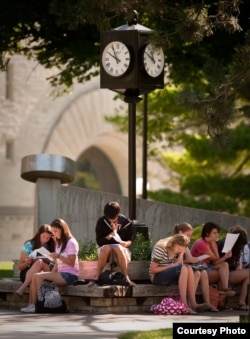Editor's Note: This report is part of a continuing series offering advice to students at colleges and universities on how to be successful throughout their educational experience.
A college or university campus is more than just an area for classes, research and studying. Many aim to be communities. That is why so many schools want students to feel like the campus is their home.
One way colleges and universities in the United States build community is to require students to live on campus for at least some amount of time. The buildings where students live are called dormitories, or dorms.
They include shared living spaces, usually designed to fit two or more people. They also often have bathrooms and eating areas that all residents share.
Nick Lander gives several reasons so many schools require new students to live in the dorms. Lander is the associate director of residence life at Kansas State University in Manhattan, Kansas.
Research shows that students who live on campus do better in terms of academic success and in learning where everything is on campus, he told VOA. Research also shows that campus residents do better at making connections with their professors and other students.
Connections with other students are important, says Lander. Many new students are between 18 and 23 years old, an age when some might benefit from having others around to help them grow as independent adults. So even at schools like his, which do not require students to live on campus, dorm life is a choice the students might want to consider.
“They may be doing their own laundry for the first time,” Lander said. “They may be sharing space[s] with another person for the first time. … They may be, in some cases, responsible for making their own meals. So those things kind of happening in a collaborative environment, where there’s support and people they can share those experiences with, I think makes a very positive impact for students.”
However, he admits that living with strangers is not always easy. First year students are not often able to choose exactly who their roommates will be. Also, some people really value their privacy.
Colleges and universities in the U.S. try to admit as many different kinds of people as they can. This might cause difficulties for people who grew up in places where the majority of people were just like them, Lander says. That is why schools with on campus housing try to offer strong residence life programs and services.
One thing almost all college dormitories have are resident assistants, or RAs. These are students who have already been studying at the school for some time. In exchange for pay or free housing, they act as representatives of the school, ensuring students are safe and follow the rules. They also connect students with whatever campus resources they may need and plan fun or informational events.
There are usually also several full-time employees on campuses acting as resident directors. They are trained to solve disputes between residents and give them the skills to create an enjoyable, healthy community.
Lander suggests that making use of these services and programs while in college can help prepare students for situations in the real world.
“When you … have a job and you’re sharing an office space, for example, with another person, or you’re in a relationship or you have a family, you have to learn how to deal with conflict, you have to learn how to communicate,” he said.
After their first year, more housing choices open up for college students. Schools often offer their larger living spaces only to students in their second year or above. These students are also usually able to choose their roommates.
But for complete freedom, students can always choose to live off-campus, Lander notes. Many of the cities and towns surrounding college and university campuses have plenty of private property owners that are willing to rent to students. And the schools sometimes offer online or in-person services to help students find a place to live off-campus.
Landers says that students may not enjoy all the same services living off-campus, and may face difficulties if they end up living with non-students. But they do often experience a deeper connection to the local community outside the school.
I’m Pete Musto.
Pete Musto reported this story for VOA Learning English. Kelly Jean Kelly was the editor. We want to hear from you. What is on-campus housing like at colleges and universities in your community? Write to us in the Comments Section or on our Facebook page.
_________________________________________________________________
Words in This Story
campus – n. the area and buildings around a university, college, or school
resident(s) – n. someone who lives in a given place
academic – adj. of or relating to schools and education
benefit – v. to be useful or helpful to someone or something
laundry – n. clothes, towels, or sheets that need to be washed or that have been washed
collaborative – adj. involving or done by two or more people or groups working together to achieve or do something
positive – adj. good or useful
impact – n. a powerful or major influence or effect
roommate(s) – n. a person who shares a room, apartment, or house with someone else
rent – v. to permit someone to use something in return for payment








